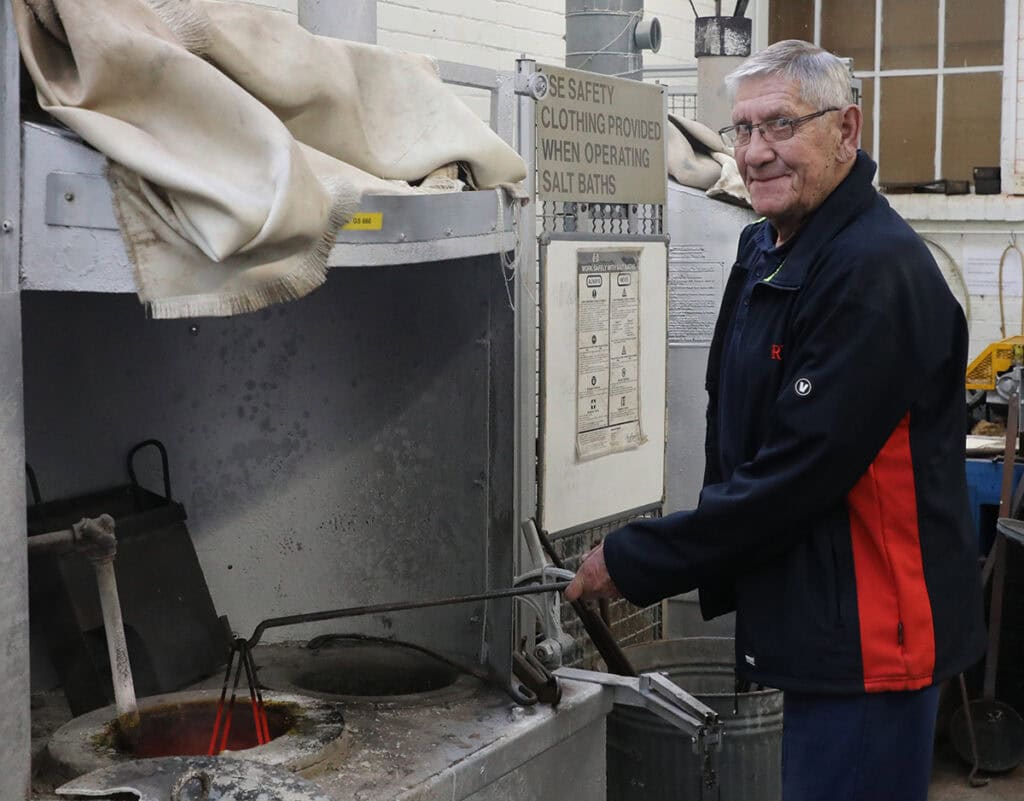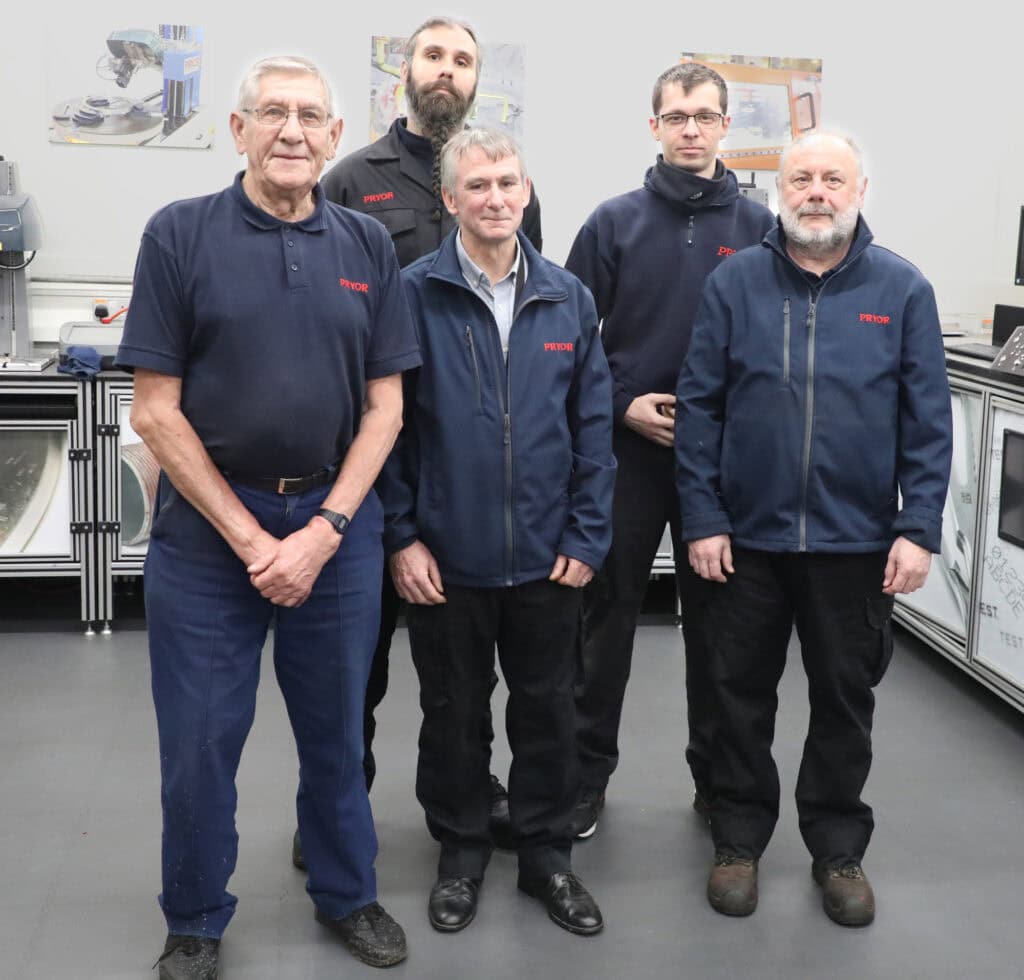Bob Nightingale retires after 55 years
Congratulations to Bob Nightingale who retires this week after more than 55 years working at Pryor. Everyone here at Pryor will miss Bob and would like to thank him for the many years he has spent here and for all his hard work.
This week our newest employee (Steve) sat down with Bob, for a chat about his time at Pryor and his upcoming retirement.

I work in the Heat Treatment Department, which is where we mainly harden steel and components that we make. We do this to make them hardwearing and suitable for their intended use.
Have you always done that here at Pryor?

A lot of my job hasn’t actually changed, but when I came here there were 4 men on these furnaces and I worked on tempering the heads of the punches, softening them so they don’t break when hit with a hammer. If they aren’t tempered, they can shatter, or a bit can chip off when a customer hits them which is obviously not good for the customer and a safety hazard.
There was a charge hand, and a manager who was also a trained metallurgist, and a lady in the corner hardness testing what we had hardened, to make sure it was made to the Pryor standard. We took pride in the quality of what did. Nothing got out of the door which wasn’t up to standard. We had an inspection department, which was in here [the sales demo room were we are sitting now], they inspected everything which we made.
There was also an engraving shop. They had their own inspection team because they were upstairs. To save them having to come downstairs to inspect, they had their own inspector. There’s a picture in the machine shop of all the inspectors, all in white coats. And all the people engraving away by hand on Pantograph machines.
Is that one of the biggest changes you’ve seen over your time here?
Well, there was no automation back then, like today with CNC machines and automated processes. There was, I don’t know how many grinders, but there was a lot of them; men on lathes and milling machines, it was all done by hand and involved more people than it does today.
When I arrived here, we couldn’t get enough work out. We we’re just taking over The Imperial Typewriter Company, we took their order book as well (Stock and Customer lists of The Imperial Typewriter company, acquired by Pryor in 1967). They had just installed a new furnace, which was semi-automated, next door to where I am now, one of Pryor’s first steps towards automation.
This Furnace used to shake the parts along the long furnace. We used to feed it one end and every so often it shook and by the time they got to the end they were really hot and when they got to the end they were then submerged in oil. The Tank was part submerged underground. They came out on a conveyer where they were washed and sprayed with a degreasing solution. They were then dropped on a tempering furnace because when they’re first hardened, they’re a bit brittle. You’ve got to take that brittleness out you know!
And that took about 45 minutes, they then went down a chute underground onto a conveyor with a fan blowing on them to cool them so they could be handled. They’d then go on another conveyor to temper the heads again. Before this furnace it was much more of a manual process.
Was there a lot of people here then?
Yes, over 400 at one point, we even used to have our own Postman for taking paperwork from one building to another. But over the years the work has changed and automating processes means less people are needed.
Where did you work before Pryor?
I worked in a Rolling Mill; you know a steel mill. I had a job in a cutlery forge too and a job in a factory that made carbide tips for lathes and such. My wife worked at Pryor before me. She sat in Reception which was in the front office on a switchboard. We only had 5 outside lines back then. You know the old type of switchboard with the plugs?
She would ring the office where the person was usually and if they didn’t answer there was a Tannoy system, which is still in place but telephones moved on so there isn’t that switchboard anymore. You’ve got to keep up with Technology or you get left behind, Pryor has always done that.
So, tell me about your first day at Pryor and what it was like?
When I first arrived, I didn’t realise how many people worked here. I started on a Monday and on the Tuesday my manager offered me 2 hours overtime on Tuesday, Wednesday and Thursday. I said “Yes” as I’d just taken a mortgage out.
Being offered overtime on your 2nd day means you must have impressed.
That’s not all, when we got to Friday, they said we’re working Saturday and Sunday morning if you want it. So, I worked a 7-day week in my first week.
My wife told me about this job that was available, and Pryor used to take on a lot of Families. Daughters and Sons working with parents, Husbands, and wives for example. It was a family firm.
It’s good to see. It might not be as common but there’s at least 1 or 2 here who had relatives who worked here, Matt Dalton in the Service team his dad used to work here.
Yeah, I knew Matt’s dad & Mr Pryor was still here when I started. Nearly every morning he’d come round and say good morning to everyone. That’s how much of a family type firm it was.
I’ve seen lots of people come and go, some have been here longer, but there are lots of us who have been at the company for 40 or more years.
Well, I’ve only been here 13 weeks, and it’s good to see the longevity of the workforce, it says lot to me about the company that people like yourself stay for many years.
Of course

I did, I really took to it. We had a laboratory too back then and I did a little bit of work up there at one bit. We used to take pictures of everything we made and all the new people like the apprentices. We might have half a dozen apprentices and we’d take them in the back garden and take a picture. All put in an album and saved. There was real pride in everything that was produced, and a real family feel to the company
Do you have any plans for after you retire?
No not yet I’ve not put anything into place yet.
Do you have any hobbies you’re wanting to spend time doing?
No not really. I’ve got a good family around me, looking after me so spending time with them. I used to go away on some good holidays with my wife, we had some good holidays.
What’s your favourite place you’ve been to ?
I would say, Lanzarote, my youngest son loves it there too, He’d live there if he could. I’ve been to Spain a few times too. A woman here who was my team leader retired about 5 years ago and went over to Spain to live. It’s nice that.
It’s definitely better weather than here.
Yeah, looking back there’s been a lot of change, the workforce has been reduced. Technology has moved on. Some companies have moved things abroad that sort of thing.
It’s good to see Pryor still in Sheffield.
We bought out some of the smaller companies, some were classed as competitors, and we’d take their orderbook on as well. He was quite shrewd Mr Pryor, he wasn’t a daft lad.
I’d have liked to have met him, everyone talks of him with huge respect.
He was always well dressed in a suit with a pocket watch, a smart man.
Will you miss it?
I will miss it. I’ll miss friends and colleagues.
I’m sure you’ll be welcome to come and see everyone anytime.
Come and gloat. Yeah.
Well, thank you Bob, it’s been lovely to sit and talk to you and good luck in your retirement.
Thank you.
Pryor Managing Director Simon Dunn had this to say:
“I’ve known Bob ever since I started as an Apprentice and my opinions from when I first met him are that he’s one of the most genuine, helpful positive-minded employees I’ve had the privilege of working with. The knowledge and experience he’s amassed over the years have made him the fountain of knowledge regarding material properties, heat treatment, and plating. Over the last few years, he’s spent much of his time unselfishly passing on his knowledge to the next generation of heat treatment specialists that we employ. Without his mentoring and guidance, the company would have struggled to keep up with the standards that Bob has maintained over the years. No training centre comes close to providing the levels of training that Bob has provided.”
“He’s been an incredibly loyal employee over all the years of his employment, who has seen the company transform itself with the changes in technology. He has supported the company throughout all its changes and his positive outlook on life has made him popular with every employee he comes into contact with.”
“It will be a sad day when we no longer see Bob within the company, but I can also say that on behalf of all employees, it’s also a time to celebrate, to see Bob hanging up his overalls for the last time and moving into well-deserved retirement. All the best for the future and please don’t become a stranger!”